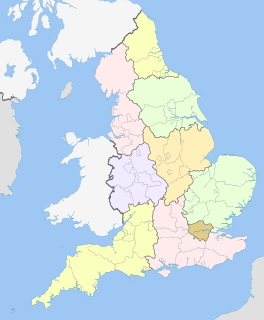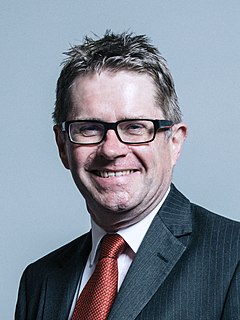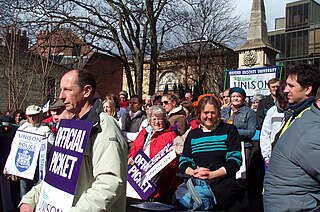A quango or QUANGO is a quasi-autonomous non-governmental organisation. It is typically an organisation to which a government has devolved power, but which is still partly controlled and/or financed by government bodies. As its name suggests, a quango is a hybrid form of organization, with elements of both non-government organizations (NGOs) and public sector bodies. The concept is most often applied in the United Kingdom and, to a lesser degree, Australia, Canada, Ireland, New Zealand, the United States, and other English-speaking countries.

Her Majesty's Principal Secretary of State for Education is the chief minister of the Department for Education in the United Kingdom government. The position was re-established on 12 May 2010. Under the provisions for devolved government in the UK its remit applies only to England, covering;

The Department of Trade and Industry (DTI) was a United Kingdom government department formed on 19 October 1970. It was replaced with the creation of the Department for Business, Enterprise and Regulatory Reform and the Department for Innovation, Universities and Skills on 28 June 2007.

Francis Anthony Aylmer Maude, Baron Maude of Horsham is a British Conservative politician, who served over 25 years on the front bench in the House of Commons, including posts as Minister for the Cabinet Office and Paymaster-General, as well as Member of Parliament representing Horsham in Sussex, and then as Baron Maude of Horsham as Minister of State for Trade and Investment until April 2016.

The Parliamentary Committees of the United Kingdom are sub-legislative organizations each consisting of small number of Members of Parliament from the House of Commons, or peers from the House of Lords, or a mix of both appointed to deal with particular areas or issues; most are made up of members of the Commons. The majority of parliamentary committees are Select Committees. The remit of these committees vary depending on whether they are committees of the House of Commons or the House of Lords.

In the United Kingdom, regional development agencies (RDAs) were nine non-departmental public bodies established for the purpose of development, primarily economic, of England's Government Office regions between 1998 and 2010. There was one RDA for each of the NUTS level 1 regions of England. Similar activities were carried out in Wales by the Welsh Government Department of Economy and Transport, in Northern Ireland by the Department of Enterprise, Trade and Investment and in Scotland by Scottish Enterprise and Highlands and Islands Enterprise.

The Advisory, Conciliation and Arbitration Service (Acas) is a Crown non-departmental public body of the Government of the United Kingdom. Its purpose is to improve organisations and working life through the promotion and facilitation of strong industrial relations practice. It may do this through a number of media such as arbitration or mediation, although the service is perhaps best known for its collective conciliation function - that is resolving disputes between groups of employees or workers, often represented by a trade union, and their employers. Acas is an independent and impartial organisation that does not side with a particular party, but rather will help the parties to reach suitable resolutions in a dispute.
SITPRO Limited was a UK non-departmental public body that was constituted as a limited company and was focused on the removal of barriers to international trade through the simplification and harmonisation of trade procedures. Based in London, SITPRO was dedicated to encouraging and helping business trade more effectively and to simplifying the international trading process. It was closed as part of government cut-backs in September 2010.

Kevin Denis Brennan is a British Labour Party politician who was first elected as the Member of Parliament (MP) for Cardiff West in 2001, and was a Minister of State at both the Department for Business, Innovation and Skills and the Department for Children, Schools and Families before the 2010 general election. His responsibilities included Further Education, Skills, Apprenticeships and Consumer Affairs.

Research Councils UK (2002–2018), sometimes known as RCUK, was a non-departmental public body which coordinated science policy in the United Kingdom. It was an umbrella organisation that coordinated the seven separate Research Councils that are responsible for funding and coordinating academic research for the arts, humanities, science and engineering. The strategic partnership of the UK's seven Research Councils, Research Councils UK has now transitioned into UK Research and Innovation (UKRI).

Innovate UK is the operating name of the Technology Strategy Board, the United Kingdom's innovation agency. It is a non-departmental public body operating at arm's length from the Government as part of the United Kingdom Research and Innovation organisation.
The Institute for Learning (IfL) was a voluntary membership, UK professional body. It ceased operating on 31 October 2014. Although precise membership figures and statistical details had been removed from IfL's webpage prior to its closure, at the end of financial year 2013-2014 IfL were reported as having only 33,500 of their 200,000 members remaining.

The Construction Industry Training Board (CITB) is the industry training board for the UK construction industry.

An executive agency is a part of a government department that is treated as managerially and budgetarily separate, to carry out some part of the executive functions of the United Kingdom government, Scottish Government, Welsh Government or Northern Ireland Executive. Executive agencies are "machinery of government" devices distinct both from non-ministerial government departments and non-departmental public bodies, each of which enjoy a real legal and constitutional separation from ministerial control. The model was also applied in several other countries.

The Skills Funding Agency was one of two successor organisations that emerged from the closure in 2010 of the Learning and Skills Council. The agency was in turn replaced by the Education and Skills Funding Agency in 2017.
Following the 2010 United Kingdom general election, the UK Government announced plans to curb public spending through the abolition of a large number of quasi-autonomous non-governmental organisations (quangos). On 23 May 2010, Chancellor of the Exchequer George Osborne unveiled a £500million plan to reduce the budget deficit by abolishing or merging many quangos. This was styled in the national press as a "bonfire of the quangos", making reference to Girolamo Savonarola's religiously inspired Bonfire of the Vanities. The cuts and closures received criticism in some quarters, but was generally welcomed by the business community.
The Office for Civil Society Advisory Body was a quasi-autonomous non-governmental organisation (quango) set up by the Government of the United Kingdom in July 2008, which advised the government on the needs of charities and voluntary organisations in the United Kingdom, and to implement the July 2007 review by HM Treasury and the Cabinet Office. The body was formed as a result of the merger of four previous advisory structures: the Voluntary and Community Sector Advisory Group, Futurebuilders Advisory Panel, Infrastructure National Partnership and the Third Sector Review Advisory Group, was chaired by Baroness Jill Pitkeathley OBE, and was part of the Cabinet Office's Office of Civil Society.

The Competition and Markets Authority (CMA) is a non-ministerial government department in the United Kingdom, responsible for strengthening business competition and preventing and reducing anti-competitive activities. The CMA launched in shadow form on 1 October 2013 and began operating fully on 1 April 2014, when it assumed many of the functions of the previously existing Competition Commission and Office of Fair Trading, which were abolished.

The Department for Business, Energy and Industrial Strategy (BEIS) is a department of the government of the United Kingdom, which was created by Theresa May on 14 July 2016 following her appointment as Prime Minister, through a merger between the Department for Business, Innovation and Skills (BIS) and Department of Energy and Climate Change (DECC).

Her Majesty's Principal Secretary of State for Business, Energy and Industrial Strategy (DEBEIS), or informally Business Secretary, is a cabinet position in the United Kingdom government. The office is responsible for the Department for Business, Energy and Industrial Strategy. The secretary of state was, until July 2016, also President of the Board of Trade when that position was transferred to the newly created post of Secretary of State for International Trade.













